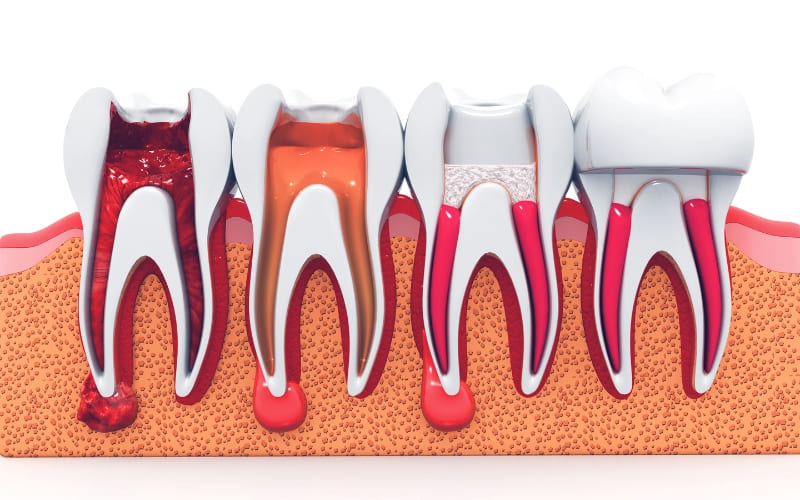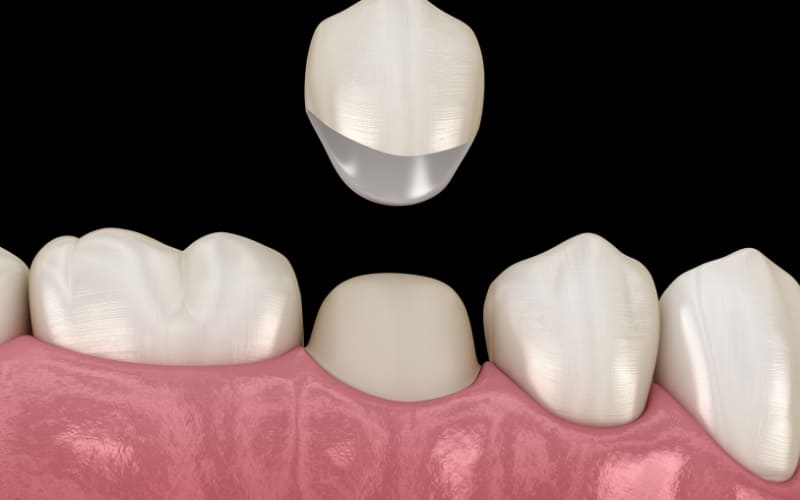Call: (810) 674-3060
Signs That Indicate The Need For A Root Canal Treatment

A root canal treatment is a dental procedure designed to treat infected or damaged tooth pulp within the tooth’s root. During the procedure, the infected pulp is removed, and the inside of the tooth is cleaned, disinfected, and filled to prevent further infection. This treatment aims to save the natural tooth from extraction while alleviating pain and restoring functionality.
Early diagnosis and treatment are crucial to prevent the spread of infection, preserve the tooth, and avoid complications like abscesses or systemic diseases. Timely intervention can also spare patients from more extensive and costly dental procedures.
Signs That Indicate The Need For A Root Canal Treatment
1. Persistent Pain:
The pain associated with needing a root canal can vary in intensity and character. It may present as a throbbing ache, a sharp, stabbing sensation, or dull discomfort. What distinguishes this pain is its persistence, often worsening over time rather than subsiding. Furthermore, it intensifies when pressure is applied, such as chewing or biting down. This indicates that the nerve within the tooth’s pulp is inflamed or damaged, necessitating intervention through root canal treatment to alleviate the discomfort and address the underlying issue.
2. Temperature Sensitivity:
Lingering sensitivity to hot or cold substances is a hallmark sign of nerve damage within the tooth. Even after removing the stimulus, the discomfort may persist for an extended period, indicating that the tooth’s nerve is compromised. This sensitivity can significantly impact daily activities like eating and drinking; even mild temperature changes can trigger discomfort. Root canal therapy becomes necessary to remove the damaged nerve tissue and restore the tooth’s ability to tolerate temperature variations without pain.
3. Swollen Gums:
Swelling of the gums surrounding the affected tooth is often a visible indication of underlying infection or inflammation. The swollen area may appear red, inflamed, and tender to the touch. Discomfort or pain may accompany the swelling, especially when pressure is applied. If left untreated, the infection can progress, leading to the formation of a gum abscess. This pus-filled sac exacerbates discomfort and risks spreading the disease further into the surrounding tissues.
4. Discolored Tooth:
A tooth that has darkened or turned grayish may signal pulp necrosis, where the tissue inside the tooth has died. As the blood supply to the tooth diminishes, it takes on a darker hue due to the accumulation of debris and breakdown products within the pulp chamber. This discoloration is often noticeable and may occur gradually over time. Root canal treatment is necessary to remove the necrotic tissue and restore the tooth’s appearance and functionality.
5. Other Signs:
In addition to the symptoms above, other indicators of the need for a root canal may include loose teeth, persistent bad breath, or facial swelling. Loose teeth can result from the advancing infection’s destruction of supporting bone tissue, while lousy breath may stem from the bacterial buildup associated with dental decay and disease. Facial swelling can occur as the infection spreads into the surrounding tissues, leading to inflammation and fluid accumulation. These signs underscore the urgency of seeking dental care to address the underlying issue and prevent further complications.
Final Words!
In conclusion, if you experience any signs indicating the need for a root canal—persistent pain, temperature sensitivity, swollen gums, discolored teeth, or other symptoms—it’s crucial to seek prompt dental attention. Ignoring these signs can lead to further complications, including tooth loss and systemic infections. By visiting a trusted dentist like Burton Family Dental, you can receive timely diagnosis and root canal treatment, preserving your natural tooth, relieving pain, and preventing the spread of infection. Prioritize your oral health and schedule an appointment today to maintain a healthy, functional smile for years.
Frequently Asked Questions
Root canal treatment is a dental procedure that treats infected or damaged tooth pulp within the tooth’s root. The infected pulp is removed during the procedure, and the tooth’s interior is cleaned, disinfected, and filled to prevent further infection.
Signs indicating the need for a root canal treatment include persistent pain, temperature sensitivity, swollen gums, discolored teeth, loose teeth, persistent bad breath, or facial swelling. These symptoms suggest underlying issues such as nerve damage, infection, or pulp necrosis, which may require intervention.
Symptoms of nerve damage within a tooth include persistent pain that worsens over time, sensitivity to hot or cold substances even after the stimulus is removed, and discomfort intensified by pressure, such as chewing or biting down.
Early diagnosis and treatment are crucial to prevent the spread of infection, preserve the affected tooth, and avoid complications like abscesses or systemic diseases. Timely intervention can also spare patients from more extensive and costly dental procedures.
Root canal treatment removes infected or damaged pulp, disinfects the interior of the tooth, and fills it to prevent further infection. This helps alleviate pain, restore functionality to the tooth, and preserve it from extraction, thus maintaining oral health and preventing complications.




